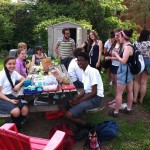By Tegvir Singh Boora and Evandros Kaklamanos
On May 29th, the Environment Committee, or EC, hosted an event called the Park’ N’ Lot Party. This event was held to celebrate the completion of the conversion of an unused, unenvironmental parking lot behind the back field into a garden where natural and wholesome food can be grown.
This project started about 4 years ago, when EC members noticed there was an unused parking lot behind the back field. Parking lots contribute to the urban heat island effect in a significant way. This is explained by Leela Schmash, a dedicated EC member and environmentalist. “The heat island effect is what happens when sunlight reflects off of concrete (roads, rooftops, etc.): it becomes trapped between the ground and the ozone layer, contributing to global warming and climate change. Creating more green spaces in urban areas helps to reduce the consequences of this phenomenon. The Park n’ Lot is a prime example of a positive endeavour towards change— what was once a useless vacant parking lot is now a flourishing, light-absorbing garden. Not only has its creation (and the removal of the asphalt) helped to reduce the heat island effect, the local, organic produce it supplies us with has also made the RWA and Montreal-West communities more sustainable over all.”
To combat this effect, the Environment Committee decided to convert this old parking lot into a garden to make the school more environmentally friendly. EC members first installed above-ground planters. They grew many different vegetables in these planter such as chives and cucumbers. They used this food during Green Bean, another EC event, and even sold it to some Montreal-West locals who wanted fresh, organic food and to support their community. After this success, the Environment Committee finally decided to rake the final step and to rip out the asphalt and replace it with and in-ground garden.
To do so, the Environment Committee had to raise funds to hire a crew to do this for them so they started an Indiegogo campaign. The support for the project was surprising and touching. With the support of the RWA community by parents, teachers, students and residents of Montreal-West, enough money was raised to rip out the asphalt.
After this was done, EC members till remained hard at work, planting more food and finishing up the garden. May 29th was a celebration of all this hard work. EC members ate food, some of which was even grown from their own garden, as a true celebration of environmentalism and what can happen when students decide they can make a difference.


